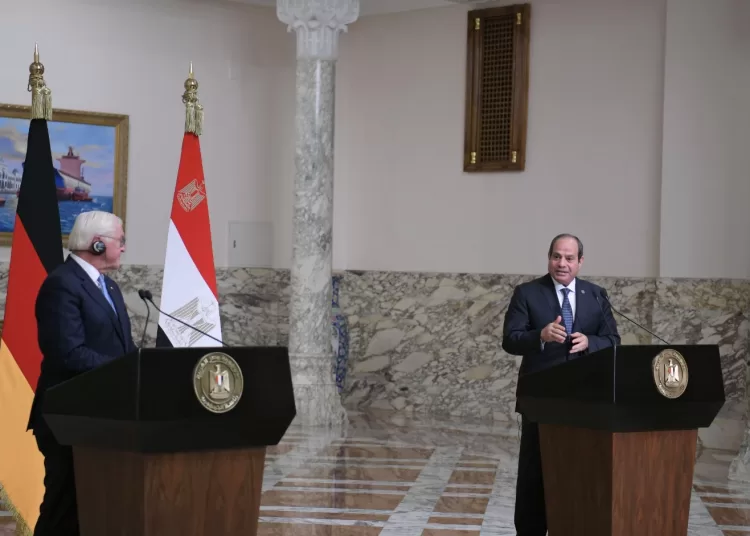CAIRO – German President Frank-Walter Steinmeier’s visit to Egypt represents a major and important addition to the course of Egyptian-German relations and a reflection of an extended history of friendship and joint cooperation between the two friendly countries and peoples, President Abdel Fattah El Sisi said Wednesday.
During a joint press conference with the German president at Al-Ittihadiya Palace, Sisi said: “I welcome you as no German president has visited Egypt for the past 25 years.”
“Egypt appreciates the partnership and is keen on enhancing cooperation with Germany, out of respect for the State of Germany and the German personality that is appreciated and cherished, and we are proud that Germany is one of our most important and largest partners in Egypt,” Sisi added.
German companies are valued in large projects such as energy and transportation ones, and the contribution of the companies was great, and appreciated by the Egyptian side, he said, noting that these national projects had a great impact on infrastructure in Egypt.
He welcomed the German companies that work in national projects in Egypt.
Sisi said he and Steinmeier discussed several issues at the bilateral or regional level.
He highlighted the importance of developing cooperation relations between the two countries and forming a mechanism for strategic cooperation between them under the supervision of the two foreign ministers.
Sisi pointed out that the talks touched on the education and capacity building files between the two countries, which is something that Egypt appreciates.
“We are ready to move with German partners to cooperate with the largest possible number of universities and schools because we need that in Egypt,” he further added.
“We welcome German companies to invest in Egypt, and I assure them that their investments are largely secured and protected,” the president added.
“Egypt is committed to protect investments in general, German investments and the returns of German companies,” Sisi pointed out.
“It is important for people to know that Egypt has been exposed, over the course of four years, to huge crises that it has nothing to do with them, starting with the Corona crisis, the Russian-Ukrainian crisis, and the Gaza Strip crisis, the president said.”
The Egyptian leader said: “Our three borders, whether in the south with Sudan or the west with Libya or even with Israel and the Gaza Strip in northeast, are unstable and have very significant repercussions.”
Sisi pointed out that the impact of these conditions has been clear over the past 10 to 12 years, as the number of guests who were displaced to Egypt as a result of crises in their countries such as Yemen, Libya, Syria, Sudan and South Sudan has reached more than 9 million people.
“Egypt did not define these people as displaced persons or refugees, and they do not live in camps but have been integrated into the Egyptian society,” Sisi explained.
“Egypt has been keen since September 2016 to prevent the departure of any illegal immigration boats from Egypt towards Europe, out of respect and from a humanitarian and moral perspective, to avoid exposing these people to danger at sea and to maintain the security and stability of our partners in Europe,” he clarified.
Sisi stressed that he speaks at length about the situation in Gaza and the importance of reaching a ceasefire, finding a mechanism to bring more aid into the Strip, releasing the hostages.
He called for the need for Europe to make a great effort during this stage to encourage or pressurize the concerned parties to reach an agreement that achieves stability and alleviates the suffering of the Palestinians in the Gaza Strip.
“Egypt is seriously seeking a positive role with the Palestinians, especially with Hamas, in cooperation with Qatar and the United States, but it is also important for Europe to play a vital role in pushing additional efforts to achieve this goal,” the president said.
Sisi termed what is going on in Gaza as “a flagrant violation of human rights.”
“More than 40,000 people were killed as a result of this conflict, two-thirds of whom were women and children, in addition to more than 100,000 injured,” the president pointed out.
“In addition, hunger is used as a weapon inside the Gaza Strip against the Palestinians, which had a very significant impact on the credibility and idea of the values of human rights that we have talked about for many years,” he noted.
Furthermore, restoring stability in the Mideast region, such as Sudan, Libya and the rest of the countries, was discussed.
He pointed out that the state of unrest in the region must end, and the region must not slip into more trouble, so that the conflict does not expand further in the West Bank, southern Lebanon, Yemen and others.
The Nile water file topped the discussions between Germany and Egypt, the president said, adding that the Renaissance Dam, and Egyptian negotiations with the Ethiopian side regarding reaching a binding legal agreement on filling and operating the dam were also considered.
“We have been trying for more than ten years to reach an agreement according to international standards and laws for water or transboundary rivers,” the president lamented, noting that Egypt has had no other means of water than the Nile River for thousands of years, and it has been moving without obstacles.






Discussion about this post